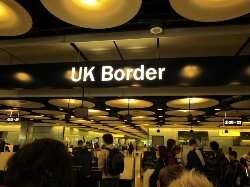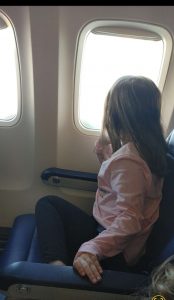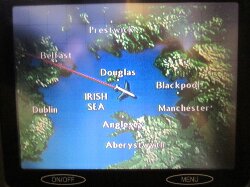
Childhood traveling can be a game-changer for kids, opening their eyes to a whole new world.
I’m a grownup Air Force brat. We lived a life of knowing our home was temporary, and the most consistent part of our life was the periodic absence of our father, and the upcoming move.
When people ask me where I am from, I simply say all over. Besides the various states in the USA, we lived in England for most of my teenage years. Our mother became a travel agent, so we traveled all over Europe. This was a life of privilege constructed from obligation and opportunity.
Whatever your reason for children traveling, and there are many, here is your list of benefits and why they matter.

Whether you’re traveling for vacation or lifestyle, childhood traveling stimulates the brain.
Studies like the notable Travel Effect Project, surveyed over 2,500 adults and 1,200 youths. They found that children who traveled often achieved higher educational levels, and earned 12% higher incomes than their peers.
No surprise! Travel pushes your kids to think critically, adapt quickly, and become creative at navigating new places, thus enhancing problem-solving skills and creativity.
They learn resilience by adapting to new surroundings and circumstances. These experiences spark curiosity and imagination.
Enrichment is the essence of traveling.

There will be times when you get lost or journey down unexpected paths.
Great! Your children have the opportunity of learning how to deal with the unexpected. Encourage them to help problem-solve, if it’s appropriate of course. Teach them the art of navigating the unexpected.
Let them plan parts of the trip, like choosing meals, picking activities, or navigating directions. This fosters independence, self-reliance, and a sense of accomplishment.
As they decipher menus and battle language barriers, they become adaptable and flexible to life’s obstacles.
Travel presents kids with opportunities for personal growth and confidence building.

Your adventures outside your children’s comfort zones will initiate new coping skills.
Interacting with diverse groups helps your children learn communication skills and empathy for others. They get the opportunity to experience new perspectives and emotions. Interacting with other children and adults teaches compassion and empathy.
Personal growth opportunities for children who engage in local community events or make friends in new places offer the chance for social skills and emotional growth.
Your children can experience new perspectives on life. They learn to reevaluate their values and outlook about others.
Traveling encourages children to strengthen their social skills and emotional intelligence.


Traveling will teach your children the importance of conscious travel.
Experiencing different cultures broadens children’s perspectives and promotes a sense of global citizenship and responsibility. This is especially true if your children have the opportunity to engage with local children either in play scenarios or local events.
Encourage your children to learn the history and customs of each destination and they then learn how similar we all are.
Trying new foods develops cultural sensitivity and an appreciation for adventure. Food is always a fun experiment. You never know what delicacy will become a new favorite.
Traveling emphasizes that we are citizens of one world and one family.

Your journey will not be without its oops moments or unplanned events.
Not to worry! These situations are the perfect teaching moment for your children. They learn to think on their feet when faced with unexpected situations, whatever they may be. These can also be great cause-and-effect training moments.
Involve your children in the problem-solving process to build critical thinking skills. They can analyze what happened and the possible menu of outcomes.
They can help strategize the best recovery plan and feel value in their thought process. What great stories they will recount to their friends and family upon their return.
Storytelling reinforces their self-confidence and communication skills.

Your adventures down the road as a family unit will cement a lasting closeness.
Sure, bickering goes with the territory of close confinement, but the comradery of shared experiences outweighs the unpleasantness of the moment. They even become fodder for future laughable memories.
No matter where you move or venture, your children learn to have each other’s back. Even though memories often differ due to their respective ages, the comradery is deep.
Interactive activities like cooking and eating local dishes or exploring historical sites as a family, deepen the bonding experience.
The bonds cultivated by traveling as a family, last a lifetime.

Childhood traveling will teach your children responsibility through active participation.
Travel allows your children to take ownership of their belongings and be held accountable for their actions. Help them create and maintain a checklist for their packing and traveling essentials. This is great for teaching executive functioning skills.
Planning, packing, navigating, and dragging luggage, facilitate a sense of importance. Their actions matter to themselves as well as the family as a whole.
This accountability for their actions transcends their adulthood, creating responsible adults. They learn to analyze their decisions and improve organizational skills.
Children who travel learn to take charge of their lives.


Traveling will teach the difference between book learning and experiential learning.
Book learning is dry and forgettable. Your children study and regurgitate facts for tests, which then fall out of their heads like water through a sieve. History remains distant and set aside, often unfathomable.
Travel offers your children play-based and hands-on learning opportunities. Visiting landmarks or historical sites brings history to life. Children can see and touch the past.
Experiencing historical sites and museums complements traditional education. It helps children understand geography, history, and science in their context.
If you’re on a genealogical trip as well, your children’s ancestors become real people.

Your family adventures will create a lifelong love for exploration in your children.
Centuries ago, people’s journeys were as big as the radius they could travel on horseback. Now your children can travel halfway around the globe in a day. Early exposure to travel can instill a passion for exploration and lifelong learning.
Childhood traveling creates a wanderlust for exploration and a passion for discovery, that they never outgrow. Encourage your children to keep travel journals and photos.
Memorializing their travels encourages organizational and creative skills. These also serve to remind them of the possibilities they can accomplish.
Travel now and change your children’s lives with exploration and discovery.

Your travel routines will teach your children how to balance their lives.
Incorporate as many of your home routines into your travel life as possible. Maintain similar bedtimes and homework times if you’re bringing their education to life through travel. Include specific travel chores to maintain responsibility.
Today’s technology creates the opportunity for your children to maintain contact with friends. This encourages a feeling of continuity.
If there are extenuating circumstances for your trip, like those related to your work, they learn by example how to balance work, family time, and adventure.
As your children blend travel routines with adventure, they learn to balance their lives.

The long-term impact of childhood traveling is monumental.
The stability and bonding experienced through family travel enables your children to take control of their lives, yet cultivates a unique closeness. “All for one and one for all!” – Our family motto.
Early traveling influences career paths, adaptability, and social skills into adulthood. Childhood travelers become culturally sensitive through their interactions with locals along their journey. This often leads to culturally related careers.
Embrace the opportunities childhood travel provides. Create in your children a wanderlust for exploration and a passion for discovery. Develop their sense of wonder to question life.
You are raising global citizens!
One Response
Hey, you’ve done a fantastic job here. I’m sharing this with my friends because I’m confident they’ll find it just as valuable as I did!